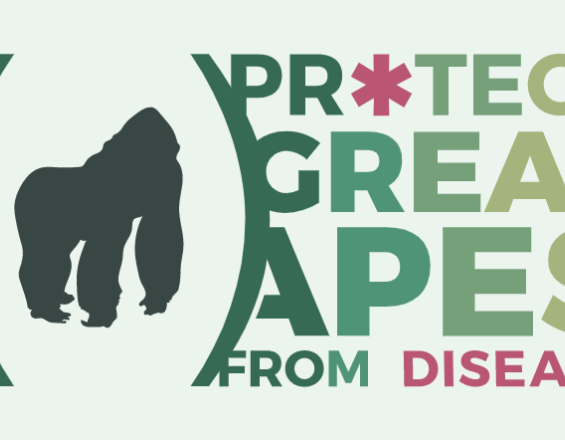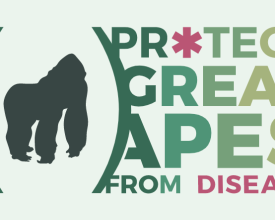Great Apes - COVID-19 Guidance

As the COVID-19 pandemic emerged, scientists and conservation managers began questioning how it would impact their research, conservation efforts, and the wellbeing of global wildlife. Primates are susceptible to the same diseases as humans, and the IUCN SSC Primate Specialist Group had previously created guidance on best practices for great apes’ protection from other respiratory diseases due to the presence of human tourists and field workers. The group began collecting questions about how COVID-19 would impact great apes from protected area managers, zookeepers, field researchers, and other individuals whose work is directly linked with the animals. A working group was put together and guidelines for how to approach great ape conservation in the face of this new and deadly pandemic were drafted and shared. These guidelines were aimed at researchers and conservationists, but have since grown and been reworked for other audiences including extractive industries, governments, and site-specific teams.
Context
Challenges addressed
The COVID-19 pandemic put the entire world into a state of emergency and forced all sectors to quickly make changes in how they carry out their work. The lack of immediately available information about COVID-19 was a major challenge for most conservationists trying to proceed with work in a safe manner, for both themselves and the animals. The IUCN SSC Primate Specialist Group’s previous publications gave them a starting point from which they could efficiently put together an initial guidance on how to safely proceed with work related to great apes amid a respiratory disease crisis.
Location
Process
Summary of the process
The COVID-19 pandemic was a challenging and trying time for everyone. The enthusiastic membership of the IUCN SSC Primate Specialist Group utilized their expertise and previous experience with guideline creation to work efficiently through the crisis. They gathered information from trusted sources, both their own published work and that of experts outside of the group, and strategically built a new set of guidelines specific to the continuously changing reality of COVID-19.
Building Blocks
Knowledge Synthesis
There was existing guidance on how to observe and interact with great apes while protecting both their health and that of humans. While previous guidelines addressed other respiratory diseases, there were no COVID-19 specific protocols as research and information were only just beginning to become available. The working group gathered intelligence from a wide array of sources, ensuring they were capturing the most up to date and relevant details, and synthesized it into a cohesive, clear document.
Enabling factors
The guidelines previously published by the IUCN SSC Primate Specialist Group, and the group’s passionate memberships, were key enabling factors to the working group’s ability to quickly create COVID-19 specific protocols. Being able to draw directly from peer-reviewed resources streamlined the process and allowed the group to confidently create new guidelines despite the lack of COVID-19 information available at the time.
Lesson learned
The working group drew knowledge from beyond just great ape primatologists. While their expertise was a guiding factor throughout the process, inviting other people to contribute ensured a diversity of knowledge bases were captured in the guidelines. The peer-reviewed COVID-19 information available was still lacking at the time, and broadening the contributing pool of experts lead to a more comprehensive and useful set of guidelines.
Crisis Prioritization
Throughout the first months of 2020, there was an overwhelming amount of confusion and stress surrounding the COVID-19 pandemic worldwide. In the face of this drastically changing reality, the IUCN SSC Primate Specialist Group was able to come together quickly and efficiently to identify researchers’ needs, gather relevant information, and create an essential set of guidelines. A rapid mobilization of the global network of great ape specialists was able to translate the publication into multiple languages, disseminating this crucial tool to people working in the field across multiple regions.
Enabling factors
The Primate Specialist Group’s active and participatory membership was key to their successful prioritization of work in the face of an unprecedented and deadly pandemic.
Lesson learned
As the COVID-19 crisis swept the globe many people sought further purpose in their work. The members of the Primate Specialist Group were motivated by the sense of urgency gripping all walks of life and wanted to take action in a positive way. These guidelines were essential not only for people to safely continue field work, but also for the members looking to find meaning during a particularly bleak time.
Impacts
The COVID-19 pandemic brought questions of how to safely move forward in all lines of work, including conservation and research. Much of the work in this sector cannot be done remotely, so guidance on how to proceed safely, for both humans and great apes, was necessary in order for projects and duties to continue. These guidelines provided recommendations, including minimum requirements and additional best practices, on how to minimize transmission between people and apes. Essential conservation work, such as monitoring and observation, was able to continue despite the challenges brought on during this time. As other industries began adapting to the realities of the pandemic, further guidelines created by the working group enabled other businesses to put in place appropriate measures to reduce the spread of the virus causing COVID-19. This includes the ecotourism industry that many places rely on for income and as an incentive for conservation.
Beneficiaries
- Great apes
- The surrounding ecosystems, including other wild species
- Field researchers and conservationists
- Tourism sector and its dependents
